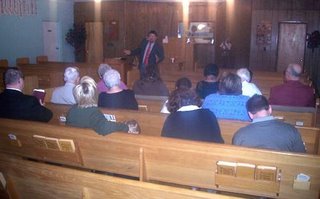 Did God need to rest? Was he tired? It would seem that an omnipotent God would not need to rest. However, I do know that he was "refreshed" on that seventh day of rest according to Exodus 31:17. I am not sure what that means for God, but I do know what it is supposed to mean for God's people. They were to take time to be refreshed on a regular basis.
Did God need to rest? Was he tired? It would seem that an omnipotent God would not need to rest. However, I do know that he was "refreshed" on that seventh day of rest according to Exodus 31:17. I am not sure what that means for God, but I do know what it is supposed to mean for God's people. They were to take time to be refreshed on a regular basis.When God commands a Sabbath rest for his people in Deuteronomy 5, he reminds them that they were slaves in Egypt, but he freed them and joined to a merciful and benevolent owner, God himself. Every seven days, everyone was to rest, including slaves, servants, visitors, and animals. Even the land itself was to receive a Sabbath year (Lev 25:4). After fifty years, there was to be a special Sabbath year in which all slaves were set free and all debts forgiven (Lev 25:10).
Sabbath was to be a rhythm that penetrated all of life. Every week, God's people were to rest, giving them an opportunity to reflect on the meaning of their work in light of God's redeeming work. God gave them Sabbath as a gift to refresh their bodies and their souls.
It seems to me that Sabbath is a time for us to interpret our work in light of God's work. Whether it was freedom from bondage to an Egyptian taskmaster, or freedom from bondage to sin, God's work results in freedom. Sabbath was a time to reflect on God's work.
There was a time when I would have said, "So what? That is in the Old Testament and we are not under the Old Testament." The extent of any study I had done concerning the Sabbath was merely to refute Sabbatarians.
While it is clear that we as Christians are not under the law (Rom 7:1ff; Heb 7-10), there is still a lot to learn from the law. In fact, Paul calls the law our "tutor" to lead us to Christ (Gal 3:24). The law teaches us lessons about the nature of holiness, sin, worship, and a number of other topics.
What are the numerous instructions concerning the Sabbath rest supposed to teach me as a Christian? Even though I as Christians am not under law, the need for Sabbath still remains. It is to be a special time for reflection, renewal, and recommitment. It seems that for so many who do not observe a periodic Sabbath in their life wind up slaves. They often become slaves to work, measuring their worth in terms of the amount of work they do or their earnings rather than in terms of the God in whose image they were created and recreated.
I suppose this means I need to take my periodic Sabbaths and they need to be non-negotiable. I understand that Sabbath rest is not the same as mere leisure. One refreshes only the body, but the other refreshes both body and soul. I need to take time to rest, refresh, reflect, reconnect, recommit, and renew. I would think this would give me the spiritual fortitude God intends for me to have for the sake of my Lord, my family, and my ministry.
The Sabbath tutors me concerning Christ. Jesus said,
"Come to Me, all who are weary and heavy-laden, and I will give you rest. Take My yoke upon you and learn from Me, for I am gentle and humble in heart, and YOU WILL FIND REST FOR YOUR SOULS. For My yoke is easy and My burden is light" (Matt 11:28-30).
Jesus himself offers "rest." What is curious is that he offers rest even as he invites me to take his yoke and his burden upon myself. That tells me that if I am weary and heavy laden, I need to put down that load and come to Christ. My self worth does not come from how much money I can make, the level of expertise I have, or the position I hold in my vocation. Rather, my self worth is connected to the God who created my in his image. It is rooted in my savior who gave the very best he could give to redeem me to himself. It is on the basis of his redemptive work that I enjoy fellowship with my Lord.
This frees me from the burden of trying to measure up. He gives me the grace to work and serve for no other motivation other than to love my Lord. Indeed, his yoke is easy and his burden is light!
If I do not take time to celebrate a Sabbath periodically, I may miss this. If I do not take the time to reflect on the meaning of my work, I may work for the wrong motivations. Even if I take time off for leisure without Sabbath, I may still miss out on the meaning of what I do. Living without the Sabbath principle may cause a certain spiritual fatigue in my soul even if my body is rested. Sabbath enables me to interpret my work in light of God's work.
Lord, I wish to nurture my soul because it is what will be eternal. It is where I commune with you. I wish to feed my soul as much as I feed my body. I await the ultimate Sabbath when I am in your presence in eternity (Heb 4).








